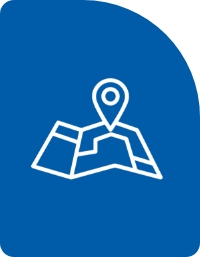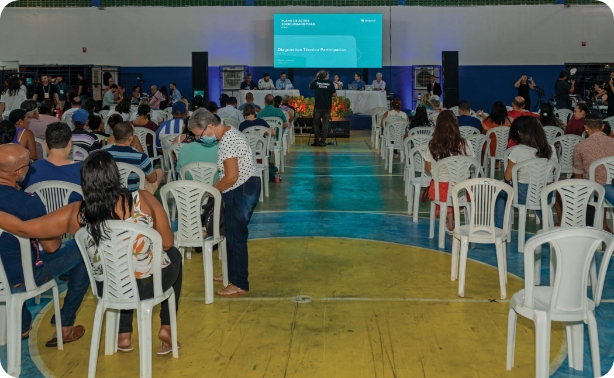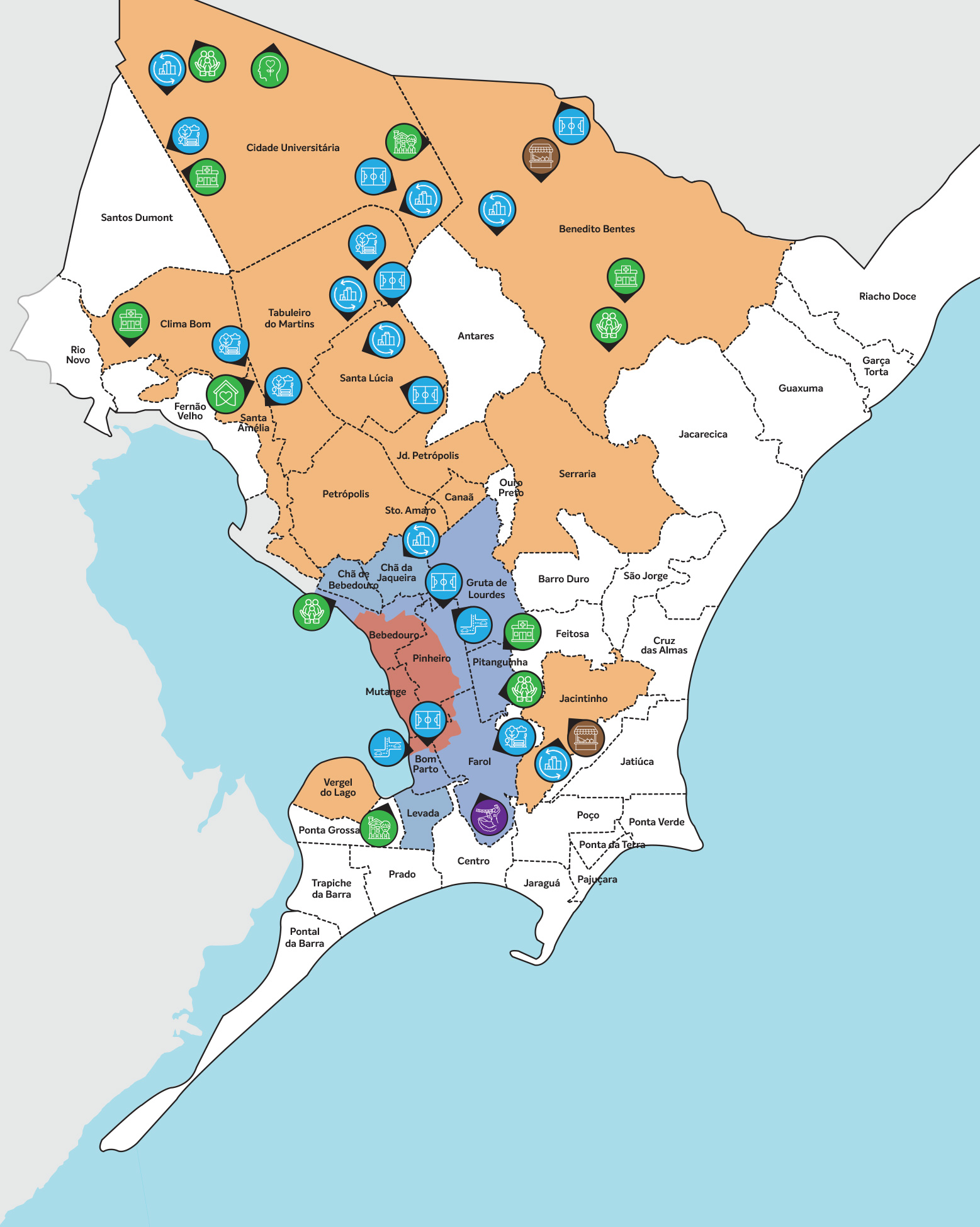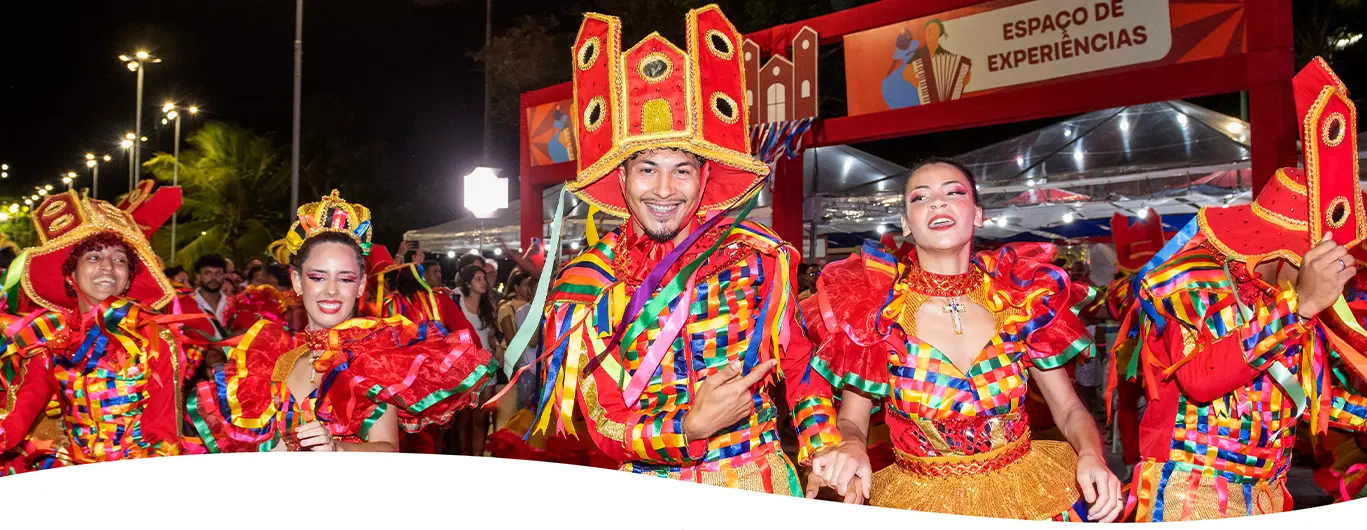Socio-urban Action Plan (PAS)
The Socio-urban Action Plan (PAS) is a strategy comprising actions and measures aimed at repairing, mitigating or compensating for any adverse impacts resulting from the evacuation of the Pinheiro, Bebedouro, Mutange, Bom Parto, and Farol neighborhoods, affecting the social and urban dynamics of the Maceió.
More than 40 initiatives have been defined, including the construction or refurbishment of daycare centers, markets, squares, and healthcare facilities, alongside efforts in cultural, social, economic, and urban development. Implementation of these initiatives involves collaboration between Braskem and the Municipality of Maceió, with responsibilities divided accordingly.
Established within the framework of the Socio-Environmental Agreement signed in December 2020 between the Federal Public Ministry, Braskem, and with the involvement of the Public Ministry of the State of Alagoas, the PAS has been embraced by the Municipality of Maceió.
The PAS design was based on social studies conducted by an independent company, as provided for in the agreement itself.
Residents, representatives of the community, entities and organizations participated in dialogues, interviews and public listening to contribute to the Technical-Participatory Diagnosis of how different regions and social groups in Maceió were affected by the relocation.

The impacted areas were classified into Focal Centers (NF) located throughout the neighborhoods of Maceió.
- NF1 - eviction area
- NF2 - surrounding area
- NF3 - more distant areas that received the relocated population
- NF4 - municipality of Maceió

Public hearings
Four public hearings were held in person and with online participation so that the community could actively participate in the preparation of the diagnosis, asking questions and making suggestions. The report was presented to the authorities and updated based on the contributions received. Initiatives are being subject to discussion and validation with both the local community and governmental authorities.

The PAS is organized into four areas:
1
Social policies and vulnerability reduction
Conditions are needed to gain access to social policies and the effects of relocation.
2
Economic activity, work and income
The impacts of relocating populations and businesses on job creation, income levels, and the availability of trade and services.
3
Urban and environmental qualification
Urban and environmental conditions and the impacts resulting from the eviction of neighborhoods, deactivation of urban businesses and services, and relocation of families and companies.
4
Preservation of culture and heritage
Impacts of relocation on cultural production and the material and immaterial heritage of the region and its communities.

Learn about the PAS (Socio-urban Action Plan) initiatives
and their designated implementation sites
CHECK THE CONSTRUCTION WORKS LOCATION ON THE MAP
 CRAS Construction or renovation
CRAS Construction or renovation
 CREAS construction
CREAS construction
 UBS or URS renovation or expansion
UBS or URS renovation or expansion
 CAPS construction
CAPS construction
 Municipal Early Childhood Education Centers construction or enovation
Municipal Early Childhood Education Centers construction or enovation
 Public markets reform
Public markets reform
 Qualification of squares
Qualification of squares
 Qualification of squares with installation of arenas
Qualification of squares with installation of arenas
 Urban improvements
Urban improvements
 Requalification and dynamization of neighborhood centers construction
Requalification and dynamization of neighborhood centers construction
 Culture and Identity Space* *Location in agreement with the Municipality.
Culture and Identity Space* *Location in agreement with the Municipality.
Click to learn about the planned actions for each region
*Priority given to NF2 and NF3


 EN
EN


